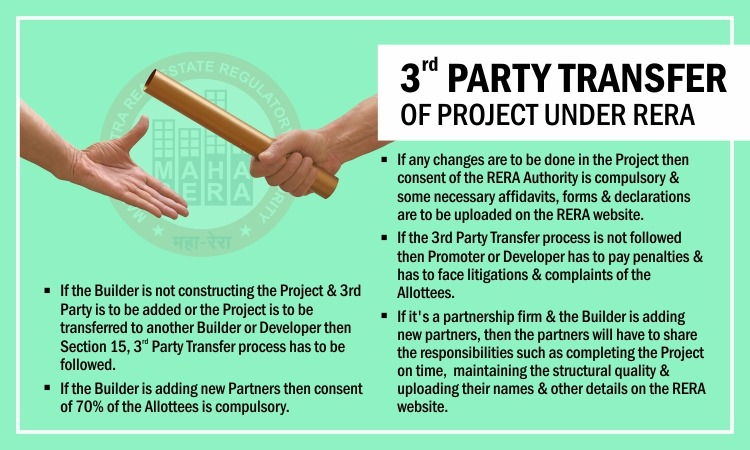The Real Estate (Regulation and Development) Act, 2016 (RERA) was enacted to protect the interests of homebuyers and promote transparency and accountability in the real estate sector. One crucial aspect of RERA is the provision for the transfer of projects to third parties or the addition of new partners by builders or developers. In this blog, we will delve into the significance of third-party transfers under Section 15 of RERA and the associated requirements and consequences.
When is a 3rd Party Transfer Necessary?
One common scenario that may necessitate a 3rd party transfer is when the original builder or developer is unable to complete the project as planned or faces financial constraints. In such cases, it becomes imperative to involve a third party or transfer the project to another builder or developer to ensure its successful completion.
Consent of Allottees and RERA Authority
If the builder intends to add new partners to the project, Section 15 of RERA mandates that they seek the consent of at least 70% of the allottees. This provision aims to ensure that homebuyers have a say in crucial decisions affecting the project.
Additionally, any changes made to the project require the consent of the RERA Authority. Builders and developers must also submit necessary affidavits, forms, and declarations to the RERA website to maintain transparency and accountability.
Consequences of Non-Compliance
Failure to adhere to the 3rd party transfer process outlined in RERA can have serious consequences for builders and developers. They may face penalties and legal actions, as well as complaints from allottees who feel their interests are not being protected.
Partnership Firms and 3rd Party Transfers
In cases where the builder operates as a partnership firm and intends to add new partners, the responsibilities of these new partners are crucial. They must commit to completing the project on time and ensuring the maintenance of structural quality. Furthermore, their names and other relevant details must be uploaded to the RERA website to maintain transparency.
Conclusion
The Real Estate (Regulation and Development) Act, 2016, has brought significant reforms to the real estate sector in India. The provisions related to 3rd party transfers and the addition of new partners are aimed at safeguarding the interests of homebuyers and ensuring transparency and accountability. Builders and developers must adhere to these regulations to avoid penalties and legal complications while striving to deliver quality projects that meet the expectations of allottees. By following the prescribed procedures and involving all stakeholders, the real estate industry can move towards a more transparent and consumer-friendly future.


